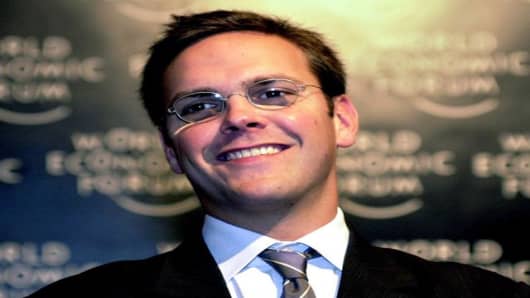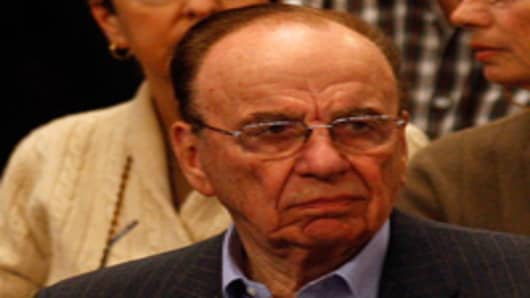“I know the News Corporation in the U.S. and the U.K. is considered the Big Brother,” said Maria LaTella, a magazine editor in Milan who hosts a Sunday-morning talk show on Sky. In Italy, she said, the News Corporation represents “the dissenting voice, the voice of freedom.” Mr. Berlusconi has called the News Corporation in Italy a friend of the “left.”
Sky Italia’s investments in original productions, particularly the gangster drama “Romanzo Criminale,”about Italian mobsters in the 1970s and ’80s and their links to state intelligence agencies, have been praised in the press for revitalizing the Italian creative scene. At a multiplex in Rome last year, James Murdoch was host for the premiere of the show’s second season and used it partly as an occasion to speak about the country’s economic doldrums and its government controls over the economy.
And in Munich, after facing doubts from those who said Germans would not warm to paying for television, and after investing nearly $1.5 billion over the last three years, News Corporation executives see glimmers of hope that Sky Deutschland is turning around as Sky Italia did. The German Sky still loses money, but it is no longer losing subscribers, having added more than 130,000 in the fourth quarter last year.
IN 2000, at the age of 27, James Murdoch was dispatched to Hong Kong to run the News Corporation’s Asian television service, Star, which was ailing at the time. It was there that he first made a major mark on the company. When he arrived, Star’s ambitions were to serve audiences across the region, in China, Taiwan, Indonesia, India and so on.
China was becoming increasingly resistant to foreign media, and James decided to focus almost solely on India — long before American media companies were clamoring to increase their business there. The company’s channels in India — where it also owns a stake in a satellite platform — are now the most-watched in the nation, and it is the fastest-growing market among the businesses James oversees.
According to Media Partners Asia, a consulting firm, the News Corporation’s Asian businesses will generate $1 billion in revenue and $250 million in operating profit this year. When James Murdoch joined Star, the News Corporation was losing money in Asia. (This year, executives say, the company’s television business in India could generate more profit than News International over all. It is a stark metric that underscores the declining importance of newspapers, and the rising importance of pay TV, in the company’s general financial health.)
James Murdoch’s success at Star did little to blunt accusations of nepotism when, in 2003, he was appointed chief executive of Sky in London. “The press was still calling him the guy with the earring who was investing in indie music and had dropped out of Harvard,” said Jan Hall, who runs the JCA Group, a recruitment firm, and was hired by the Sky board to conduct the C.E.O. search that ultimately picked James.
“I really tried hard to get away from people who had reasons to be kind to him, and no one said anything different,” Ms. Hall said. “Fundamentally, they all felt he got the genes — the Rupert genes.”
In his first investor presentation at Sky, James Murdoch laid out bold investment plans and set a goal of increasing the number of subscribers from 7.4 million to close to 10 million. Sky’s share price promptly plummeted nearly 20 percent. But by the time he left, in 2007, Sky’s subscriber numbers had soared, and James was credited with improving technology and revitalizing the Sky brand.
James Murdoch has displayed a knack and interest for aspects of the media business that little concern his father — particularly marketing and communications. Early on at Sky, he hired Mr. Luntz to conduct market research and focus groups. At one session, in West London, a group of people were discussing what the Murdoch name meant to them. Watching behind a mirror were James and other executives.
“The Murdoch name has detractors, not just in America but in Britain,” Mr. Luntz said. “Some were very harsh, so blunt were their attacks. Ten Sky executives watched in embarrassment as person after person tore into the Murdoch name.”
Then James stepped into the room and engaged them about their comments. “He went in and they were shocked,” Mr. Luntz said. “Most C.E.O.’s would not step into a room of hostile customers.”
According to Mr. Luntz’s polling, the Sky slogan that was developed under James’s leadership, “believe in better,” has sometimes been seen as the second-most-powerful corporate motto, after Microsoft’s “Where do you want to go today?” And in 2009, Management Today magazine named Sky as Britain’s most-admired company.
Even Ms. Enders, the analyst who is critical of the Sky takeover bid, said of James Murdoch: “He is, in my opinion, as it relates to BSkyB, a business genius.”
ALONG the way, James Murdoch has epitomized the same conservative temperament as his father when it comes to free markets. But on other issues, particularly environmental ones, he is at odds with modern-day conservatism.
In London, he holds dinners that bring together environmental advocates, academics and executives. In the summer of 2008, James held a dinner for Fred Krupp, the head of the Environmental Defense Fund, an advocacy group based in New York. The event was attended by Boris Johnson, the mayor of London, and Tony Hayward, then the chief executive of BP.
James Murdoch told the group that the News Corporation’s own environmental efforts had saved it $35 million. On such matters, he has cast himself as a Teddy Roosevelt-style conservative and has sought to link environmental protection with sound business practice.
The liberal media watchdog Media Matters has crusaded against Fox News’s coverage of the climate issue, having released e-mails it obtained last year in which a Fox editor told staff members: “Given the controversy over the veracity of climate change data ... ... we should refrain from asserting that the planet has warmed (or cooled) in any given period without IMMEDIATELY pointing out that such theories are based upon data that critics have called into question.”
James Murdoch’s views raise the question of whether he would interfere with Fox News’s coverage if he were running the News Corporation. In an interview published in 2009, he said: “All of the climate-prediction models suggest we’re on the worst-case trajectory, and some cases worse than the worst case. That’s my depressing take on it.”
On other stages, particularly at the Edinburgh lecture, he has been a loud proponent of deregulated markets and laissez-faire economics, making him a lightning rod in certain corners of the British media.
“He became a champion for the free market in the media, and not everyone likes that,” Ms. Hall said. “Not everyone wants a free market as he would champion.”
The company’s Iranian venture also appeals to James as a way to spread the gospel of freedom and openness into a closed society. Executives say it is profitable — advertisers include a ski resort outside Tehran — and the company plans a second channel, aimed at Iranian women.
Farsi1 is also completing a deal to carry reruns of “The Oprah Winfrey Show,” the last new episodes of which are being filmed this year now that Ms. Winfrey has started her own cable network, and is searching for a Farsi-speaking woman to be the voice of Oprah.
The deal is awaiting word on an application from CBS — which distributed Ms. Winfrey’s show — to the Office of Foreign Asset Control of the Treasury Department, to gain a waiver from sanctions on Iran.
AS father and son left Rupert Murdoch’s London apartment on that late January night to have dinner with the staff of The Sun, a reporter from The Independent newspaper was outside, waiting to ask about the latest in the phone-hacking scandal. Such was the magnitude in the British press of Rupert Murdoch’s visit to London.
The Independent even kept a tally of the words that nine national newspapers devoted to the scandal the next day: 12,585 in total, with the left-leaning Guardian leading the way with 4,703. The Sun devoted 41 words to the story.
Ian Hargreaves, a former editor of The Independent and now a professor at Cardiff University, wrote that week: “Murdoch, and his ambitious son James, have put themselves at the center of public controversy in a manner which, in their own eyes, must represent serious miscalculation.”
The argument that James and his executives mishandled the investigation is commonly held not just among some journalists but also in the highest reaches of the News Corporation. Executives paid out-of-court settlements, and initially blamed one rogue reporter for the whole affair, even though The News of the World has said it has since dismissed an editor after finding “material evidence”’ linking him to allegations that it intercepted celebrities’ phone messages. Although James was not overseeing News International when the hacking occurred, he did approve the settlements and is responsible now for putting the scandal to rest.
The Sky Broadcasting deal, meanwhile, hangs in the balance. The News Corporation is waiting to see whether the deal will be referred to Britain’s Competition Commission for a review that could take six to nine months. If that happens, the News Corporation would have to decide whether to simply pull the offer, as executives suggest it might.
James Murdoch’s future claim to the throne will be enhanced — or clouded — based on how events transpire in London over the next weeks and months.



